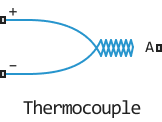Thermocouple
A thermocouple.
blockType: AcausalElectricPowerSystems.Sensors.Thermocouple
|
Path in the library: |
Description
Block Thermocouple It is a thermocouple model using the standard polynomial parameterization defined in the NIST ITS-90 thermocouple database [1].
For thermocouples of types B, E, J, K (t≤0 °C), N, R, S or T electromotive force (thermo-EMF) E on the device is equal to (in mV):
where:
-
— the ith element of the parameter value Coefficients [c0 c1 … cn].
-
— the temperature difference in degrees Celsius between the temperature at the thermal port A and the temperature of the cold junction (the value of the parameter Reference temperature).
| In the equation, the voltage across the device, depending on the temperature difference, is calculated in millivolts. The output voltage of the unit is measured in volts. |
For thermocouples of type K (t≥0 °C), the equation contains an additional exponential term:
where:
and — additional coefficients required only for type K thermocouples and determined by the value of the parameter Coefficients [a0 a1 a2].
The following equation describes the thermal behavior of the block:
where:
-
— heat flow to port A.
-
— the value of the Dissipation factor parameter, the scattering coefficient.
-
— the value of the parameter Thermal time constant, the time constant.
-
— the rate of temperature change.
Assumptions and limitations
-
The high-order polynomials used in this block are very sensitive to the number of significant digits used for calculations. When specifying the parameter Coefficients [c0 c1 … cn], use all available significant digits.
-
The values of the parameter Coefficients [c0 c1 … cn] are defined for use in the specified temperature range.
Ports
Non-directional
A — hot junction temperature
warm
The thermal port that determines the temperature of the hot junction of the thermocouple.
+ — positive
electricity
The electrical port represents the positive terminal of the thermocouple.
− — negative
electricity
The electrical port represents the negative terminal of the thermocouple.
Parameters
Electrical
Thermocouple type — pass thermocouple type:q[<br>] Type B, E, J, K (t≤0 °C), N, R, S or T (default) | Type K (t≥0 °C)
Choose one of the simulation options:
-
Type B, E, J, K (t≤0 °C), N, R, S or T– standard polynomial parameterization is used. -
Type K (t≥0 °C)– an exponential term is added to the equations when the value of the temperature difference is greater than 0 °C.
Coefficients [c0 c1 … cn] — coefficients c0, c1, … cn
[0, 0, 0, 0, 0, 0, 0, 0, 0] ( by default)
Vector of coefficients in the equation describing voltage as a function of temperature.
Coefficients [a0 a1 a2] — coefficients a0, a1 and a2
[0, 0, 0] (default)
Vector of additional coefficients , and required only for a type K thermocouple .
Dependencies
To use this parameter, set the Thermocouple model parameter to Type K (t≤0 °C).
Thermal
Reference temperature — nominal temperature of the cold junction
0 °C (default) | positive scalar
The temperature that the unit subtracts from the temperature at the thermal port when calculating the output voltage of the device.
Thermal time constant is the time constant for the thermal equation
1 s (default) | positive scalar
The time it takes for the temperature of the thermocouple to reach 63% of the final temperature change with an abrupt change in ambient temperature.
Dissipation factor is the coefficient of dissipation for the thermal equation
0.001 W/K (default) | positive scalar
The heat output required to increase the temperature of the thermocouple by 1 .
Initial temperature — initial temperature value t
25 °C (default)
The initial value of the hot junction temperature .
Literature
-
Dean C. Ripple, NIST ITS-90 Thermocouple Database, December 21, 1999 (https://srdata.nist.gov/its90/main/)
